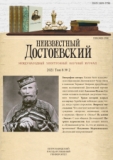«Гарибальди» у Достоевского: дополнения к комментарию
Dostoevsky’s Garibaldi: Additions to the Commentary
Author(s): Natalia V. ShvartsSubject(s): Media studies, Russian Literature, 19th Century, Philology, Theory of Literature
Published by: Петрозаводский государственный университет
Keywords: F. M. Dostoevsky; J. Garibaldi; N. I. Pirogov; Auguste Nelaton; General German Kanzler; Cardinal Antonelli; The Idiot novel; Vremya journal; St. Petersburg Vedomosti newspaper; S. A. Ivanova; Yu. A. I
Summary/Abstract: This study is a contribution to the research of the extensive topic of Dostoevsky and Garibaldi and is an analysis of two fragments from Dostoevsky’s texts, where he addressed the image of the Italian hero. This image is reflected in the artistic, journalistic and epistolary texts by Dostoevsky, his name is calligraphically printed on the pages of two of the writer’s notebooks. The article analyzes an episode from the novel The Idiot: the story of the liar and braggart General Ivolgin about his wound during the Crimean War that was treated by two outstanding surgeons — the Frenchman O. Nelaton and the Russian N. I. Pirogov. It is shown that the subtext of Ivolgin’s story refers to the story of Garibaldi’s wound in the battle of Aspromonte and the treatment of his leg by O. Nelaton and N. I. Pirogov, which Dostoevsky and his hero learned about from the newspapers. The European and Russian press, which closely followed the political events in Italy and Europe in the 1860s, created a heroic image of this man. The second reference to Garibaldi is from Dostoevsky’s Geneva letter to his niece S. A. Ivanova dated January 1 (13), 1868. It presents a parody sketch of contemporary political events and figures in Italy (Cardinal Antonelli, General Kanzler, the defeat of Garibaldi’s army at the Battle of Mentana). They are allegorically transferred to the games and amusements of the younger generation of the Ivanov family, with whom the writer spent the summer of 1866. The article corrects the error made by the publishers of Dostoevsky’s letters: the title of «general kanzler» (this is how this phrase was published) never existed — in the Battle of Mentana, the supreme commander of the papal troops, which defeated Garibaldi, was General Hermann Kanzler, who had a German origin and surname. The cases considered indicate a significant interest of the writer in the heroic personality of Giuseppe Garibaldi, his activities and fate.
Journal: Неизвестный Достоевский
- Issue Year: 8/2021
- Issue No: 2
- Page Range: 68-80
- Page Count: 13
- Language: Russian

